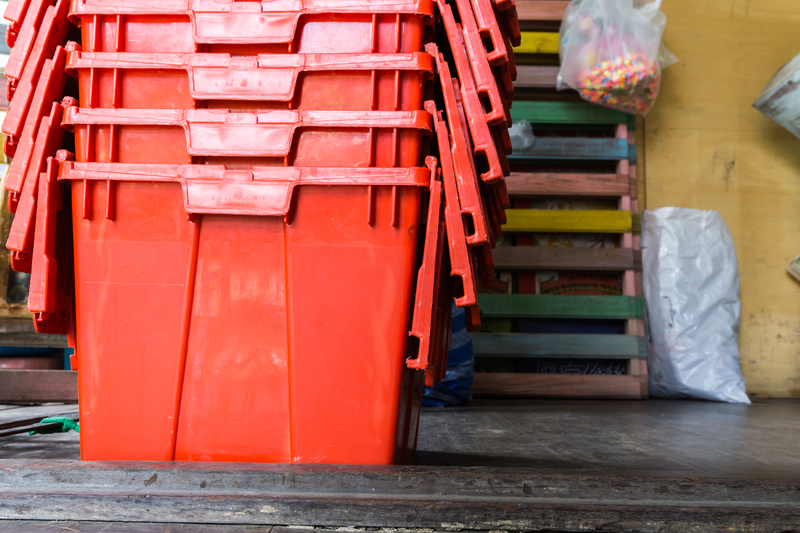Stress-Free Strategies for Moving
Posted on 06/06/2025
Stress-Free Strategies for Moving: Your Comprehensive Guide
Moving to a new home is often cited as one of life's most stressful events. Whether relocating across the country or just down the block, the process can feel overwhelming. Fortunately, with careful planning and the right methodology, it's possible to transition out of your old home and into your new one with far less anxiety. In this comprehensive guide, we'll explore stress-free strategies for moving that will help you stay organized, calm, and in control every step of the way.

Why Moving Is Stressful -- and What You Can Do About It
*Moving* is more than just packing boxes; it's about uprooting your life, adjusting to new environments, and handling countless logistics. This combination of emotional, physical, and mental demands can lead to tension and frustration. However, by understanding the challenges ahead and preparing proactively, you can minimize these feelings and achieve a stress-free move.
Causes of Moving-Related Stress
- Lack of time: Rushed moves lead to overlooked details and last-minute chaos.
- Insufficient organization: Clutter, confusion, and lost items can increase anxiety.
- Emotional attachment: Leaving behind familiar spaces and memories may create sadness or uncertainty.
- Physical demands: Packing, lifting, and cleaning are physically taxing.
- Unexpected complications: Delays, missed deadlines, or damaged belongings can derail plans.
By implementing stress-free moving tips and following a structured approach, these obstacles become far more manageable.
Effective Stress-Free Moving Strategies
Below are actionable strategies designed for a smooth and stress-free relocation experience, regardless of your moving distance or household size.
1. Start Early and Create a Detailed Timeline
Procrastination is the enemy of every successful move. As soon as you know your move-out and move-in dates, create a detailed timeline. List key milestones such as giving notice to your landlord, booking a moving company, gathering packing materials, and setting up utilities in your new place.
- Eight weeks before: Sort through possessions, donate or discard unnecessary items, and collect boxes.
- Six weeks before: Research and book movers or rental trucks.
- Four weeks before: Begin packing non-essentials and finalize travel plans.
- Two weeks before: Confirm arrangements, pack most belongings, and update your address.
- Moving week: Pack essentials, clean, and prepare for moving day!
2. Declutter Ruthlessly Before Packing
One of the best stress-free relocation tips is to downsize. Moving is the ideal opportunity to part ways with items you no longer want or need. Go room to room and sort everything into keep, donate, sell, and discard piles. Fewer items mean lower moving costs and less to unpack -- an instant stress reliever!
3. Source the Right Packing Supplies
Using the correct packing materials reduces the chances of damage and makes setting up your new space easier. Invest in sturdy boxes, bubble wrap, packing paper, tape, and markers. Don't forget specialty supplies for fragile items, wardrobe boxes for clothes, and covers for mattresses or upholstery.
- Label every box: Mark not just the contents, but also which room they belong in for easier unpacking.
- Color code: Use colored tape or stickers to identify boxes by room at a glance.
- Pack heavy items in small boxes: This prevents boxes from becoming too heavy to move safely.
4. Organize and Pack Efficiently
Don't wait until the night before your move to start packing! Begin with rarely used items -- seasonal clothing, holiday decorations, or extra linens. As moving day approaches, pack more frequently used possessions. This incremental approach is essential for a low-stress move.
- Keep an inventory sheet for valuables and important items.
- Pack essential kits: one for your first night at your new home (toiletries, chargers, change of clothes, basic kitchenware, etc.).
- Wrap breakables in clothing or towels to save space and cushion fragile items.
5. Hire Professional Movers or Get Reliable Help
A common theme among stress-free moving strategies is enlisting the right assistance. Hiring professional movers saves significant time and effort, especially for large homes or long-distance relocations. Always check reviews, obtain written estimates, and confirm licensing and insurance.
If you prefer a DIY move, recruit trusted friends or family ahead of time and offer snacks or pizza as a thank you. More hands make for lighter work and a speedier move.
6. Take Care of Utilities and Address Changes in Advance
To avoid unnecessary headaches, schedule utility shut-off and turn-on dates as soon as possible. This includes electricity, water, gas, internet, and even garbage services. File a change of address with the post office and update your address with banks, subscriptions, and other services right away.
- Tip: Keep a master list of all organizations to notify about your move.
7. Prepare for Moving Day
A successful, stress-free relocation hinges on being ready when moving day arrives. Create a moving-day checklist to ensure nothing gets overlooked, including supplies, tools, and cleaning materials. Arrange safe childcare or pet care if needed, and keep floor plans handy to direct movers.
- Dress comfortably and have snacks and water easily accessible.
- Take photos of your old and new home's condition (especially if you're renting).
- Lock up valuables and essentials for easy access at your destination.
8. Move Mindfully: Manage Your Wellbeing
Moving can also take an emotional toll, so don't forget to care for yourself. Get enough sleep, eat well, and take breaks as needed. If possible, build in time to relax and reflect on the exciting journey ahead.
- Embrace flexibility--sometimes, aspects of your move won't go as planned. Adaptability is key to keeping stress in check.
- Stay positive--Focus on new opportunities rather than lingering on what you're leaving behind.
Bonus: Advanced Moving Hacks for an Effortless Relocation
Ready to make your move even easier? Try these extra stress-free moving solutions for a streamlined transition:
- Photograph electronics before disconnecting them so you remember how to reconnect everything.
- Use suitcases to pack heavy items or books -- built-in wheels make them easy to transport.
- Pack an overnight bag for every family member so you have necessities on hand during your first night.
- Plan meals to use up pantry items before moving and avoid waste.
- Utilize self-storage as a temporary solution if your move is staggered or if your new home isn't quite ready.
Frequently Asked Questions About Moving Without Stress
Q: How early should I start planning my move?
Start planning your move at least two months in advance. This gives you ample time for decluttering, organizing, and coordinating logistics--core components of a stress-free moving experience.
Q: Should I hire professional movers or move myself?
Professional movers simplify the moving process and can be invaluable, especially for large moves or long distances. However, if your relocation is small and you have trusted help, a DIY move may save on costs. Weigh your budget, timeline, and comfort level before choosing.
Q: How do I keep track of all the details?
Use checklists, digital planning apps, or a dedicated moving binder to ensure you stay organized. Setting reminders for key dates can also help prevent oversights and reduce last-minute stress.
Moving With Kids or Pets? Stress-Less Tips for Every Family Member
Relocating with children or pets introduces extra complexity. The following strategies will help ensure a less stressful move for your entire household:
For Children:
- Involve them in the process--let them help pack their belongings or decorate their new room.
- Keep routines--try to maintain meal and bedtimes to provide comfort and stability.
- Talk openly--discuss the move and address any concerns to ease anxiety.
For Pets:
- Maintain their feeding and exercise routines throughout the moving period.
- Set up a quiet, isolated room with their favorite toys and bedding on moving day to reduce stress.
- Update their microchip or tags with your new address and contact information.

A Stress-Free Moving Day: What To Expect
Moving day can be hectic, but a calm and organized approach ensures everything goes as planned:
- Wake up early: Start with a good breakfast and have your moving checklist ready.
- Protect floors and doorways: Lay down covers to prevent dirt and damage.
- Communicate: Make sure movers know exactly what needs to go and what stays.
- Final walkthrough: Check closets, cupboards, and shelves so you don't leave anything behind.
- Enjoy the journey: Allow yourself to feel excited about your new beginning!
Conclusion: Enjoying a Smooth and Stress-Free Move
With the right approach, moving doesn't have to be a nerve-wracking experience. By planning ahead, decluttering, staying organized, and taking care of your mental well-being, a stress-free transition to your new home is entirely possible.
Remember, every move is a fresh start--embrace the adventure, connect with your new community, and celebrate your achievements. With these stress-free strategies for moving, you can minimize anxiety, avoid chaos, and focus on a bright new chapter in your life.
Your next move doesn't have to be stressful--make it the smoothest one yet!
Latest Posts
The Ultimate Guide to Moving Your Bed and Mattress
Proven Strategies for Storing a Freezer When Idle
Achieving Packing Success: Tips for Moving Your House






